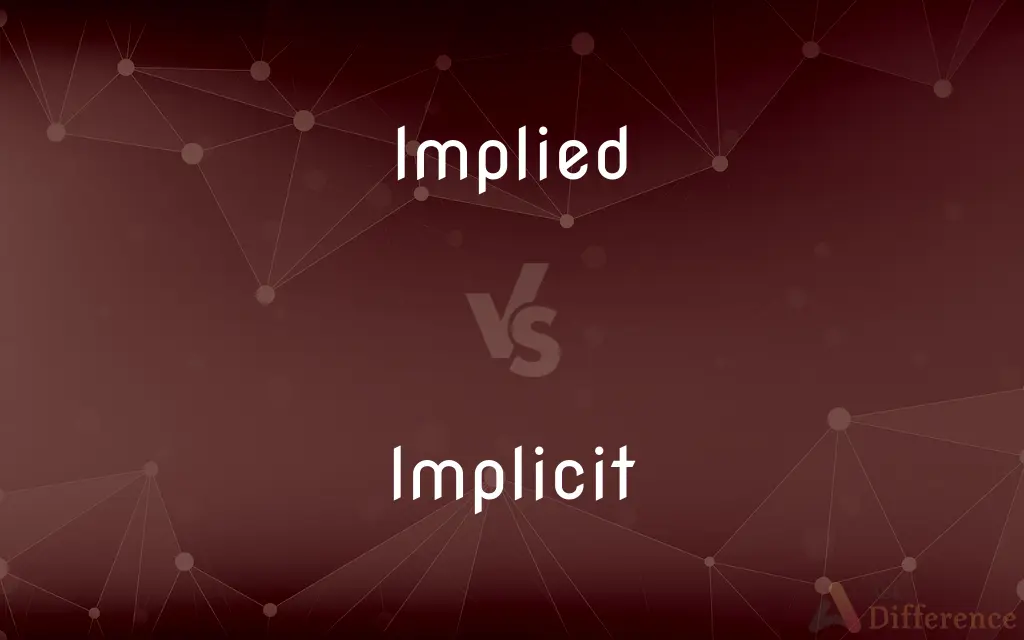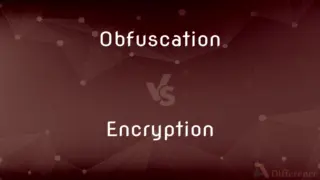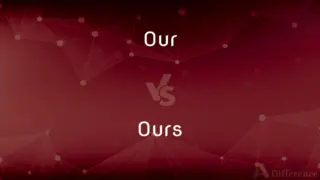Implied vs. Implicit — What's the Difference?
By Urooj Arif & Fiza Rafique — Updated on April 4, 2024
Implied content is suggested without being directly stated, often through context or tone, while implicit content is inherently understood as part of something, without needing explicit mention.

Difference Between Implied and Implicit
Table of Contents
ADVERTISEMENT
Key Differences
Implied content relies on indirect cues or context for its communication, necessitating interpretation beyond the literal meaning. For example, a sarcastic remark may imply the opposite of what is directly stated. On the other hand, implicit content is an integral part of the message or concept, understood without needing to be spelled out, like the implicit trust in close relationships.
While implied meanings often depend on the receiver's ability to pick up on subtleties, nuances, and context, implicit content forms a foundational aspect of understanding, assumed to be universally recognized among those familiar with the context. For instance, cultural norms may implicitly dictate behavior without ever being openly discussed, whereas implied meanings in conversation require active interpretation based on shared knowledge or signals.
In communication, implying something involves the speaker or writer hinting at a message without directly stating it, leaving room for interpretation. Conversely, something implicit is so naturally a part of the communication that it goes without saying, woven into the fabric of the message or the medium itself.
The process of implying often engages the listener or reader in a more active role, requiring them to infer or deduce the intended meaning behind the words or actions. Implicit content, however, is more about the receiver's automatic understanding based on shared assumptions or inherent aspects of the communication.
Implicit content is often used to establish a common ground in communication, relying on shared knowledge or beliefs, while implying is a strategic choice by the communicator to suggest a message indirectly, possibly to soften the delivery, add subtlety, or create an inclusive feeling among those 'in the know.'
ADVERTISEMENT
Comparison Chart
Communication Method
Indirect, through context or tone
Inherent, needing no explicit mention
Receiver's Role
Active interpretation required
Automatic understanding based on shared context
Dependence
On subtleties and the ability to infer
On inherent understanding and assumptions
Usage
To hint at something without stating it directly
Understood as a given within the content or situation
Examples
Sarcasm implying the opposite of the literal meaning
Implicit trust in a friendship
Compare with Definitions
Implied
Suggested but not directly expressed; hinted at.
His tone implied disappointment, though he didn’t say it.
Implicit
Inherently contained or involved in something.
Trust is implicit in their partnership.
Implied
Indirectly indicated or suggested.
The silence implied consent, even if no words were spoken.
Implicit
Implied though not plainly expressed.
There’s an implicit agreement among friends to not share secrets.
Implied
Inferred from circumstances or context.
The abandoned toys implied that children once played there.
Implicit
Without doubts or reservations; absolute.
His silence gave implicit consent.
Implied
Hinted at through context or actions.
The closed door implied the meeting was private.
Implicit
Forming an inseparable part of something.
Respect is implicit in their interaction.
Implied
Conveyed through implication, not explicit statement.
The smirk on her face implied she knew more than she let on.
Implicit
Understood without being stated.
The rules of etiquette are often implicit.
Implied
To express or state indirectly
She implied that she was in a hurry.
Implicit
Suggested though not directly expressed
Comments seen as implicit criticism of the policies
Implied
To make evident indirectly
His fine clothes implied that he was wealthy. See Usage Note at infer.
Implicit
Always to be found in; essentially connected with
The values implicit in the school ethos
Implied
To involve by logical necessity; entail
Life implies growth and death.
Implicit
With no qualification or question; absolute
An implicit faith in God
Implied
Suggested without being stated directly; implicated or hinted at.
Implicit
(of a function) not expressed directly in terms of independent variables.
Implied
Simple past tense and past participle of imply
Implicit
Implied or understood though not directly expressed
An implicit agreement not to raise the touchy subject.
Implied
Virtually involved or included; involved in substance; inferential; tacitly conceded; - the correlative of express, or expressed. See Imply.
Implicit
Contained in the nature of something though not readily apparent
"Frustration is implicit in any attempt to express the deepest self" (Patricia Hampl).
Implied
Indicated by necessary connotation though not expressed directly;
Gave silent consent
A tacit agreement
The understood provisos of a custody agreement
Implicit
Having no doubts or reservations; unquestioning
Implicit trust.
Implicit
Implied indirectly, without being directly expressed
Implicit
Contained in the essential nature of something but not openly shown
Implicit
Having no reservations or doubts; unquestioning or unconditional; usually said of faith or trust.
Implicit
(obsolete) entangled, twisted together.
Implicit
Infolded; entangled; complicated; involved.
In his woolly fleeceI cling implicit.
Implicit
Tacitly comprised; fairly to be understood, though not expressed in words; implied; as, an implicit contract or agreement.
Implicit
Resting on another; trusting in the word or authority of another, without doubt or reserve; unquestioning; complete; as, implicit confidence; implicit obedience.
Back again to implicit faith I fall.
Implicit
Implied though not directly expressed; inherent in the nature of something;
An implicit agreement not to raise the subject
There was implicit criticism in his voice
Anger was implicit in the argument
The oak is implicit in the acorn
Implicit
Being without doubt or reserve;
Implicit trust
Common Curiosities
Can the implicit become explicit?
Yes, what is implicit can be made explicit when it’s directly stated or clearly articulated, moving from an assumed to a declared form.
How does culture affect implied and implicit meanings?
Culture significantly influences what is implied or implicit, as shared cultural knowledge determines how messages are conveyed and understood.
Is implicit content more common in certain types of communication?
Implicit content is often found in more formal, established, or culturally rich contexts where shared understanding is assumed.
Why might someone choose to imply rather than state explicitly?
Implied communication can create a sense of subtlety, tact, or shared understanding, or it may be used to avoid direct confrontation or offense.
Can something be both implied and implicit?
Yes, content can be both implied and implicit when it’s subtly suggested and also inherently understood within the context.
Is implicit content always understood by everyone?
Implicit content is generally understood by those who share a common background or knowledge, but not necessarily by everyone outside that group.
Are implied messages less important than explicit ones?
Not necessarily; implied messages can carry significant meaning and impact, especially in nuanced or sensitive communications.
How do you recognize something that's implicit?
Recognizing implicit content requires understanding the underlying assumptions or shared knowledge that make the content obvious without explicit mention.
Why is understanding implicit content important in communication?
Understanding implicit content is crucial for effective communication, as it ensures a shared understanding and prevents misinterpretation.
Can misunderstanding arise from implied content?
Yes, because implied content relies on interpretation, there’s a higher risk of misunderstanding if the receiver misses the context or subtleties.
How do new members of a group learn its implicit norms?
New members learn implicit norms through observation, experience, and sometimes through guidance from more experienced members.
How can one improve their ability to communicate implied messages?
Improving the ability to communicate implied messages involves enhancing awareness of context, audience, and non-verbal cues.
Can the effectiveness of implied communication change over time?
Yes, as relationships or contexts evolve, what is effectively implied can change, requiring adjustments in communication styles.
Are there risks in relying too much on implicit communication?
Relying too much on implicit communication can lead to assumptions and misunderstandings, particularly with those from different backgrounds or cultures.
How can educators teach the nuances of implied and implicit content?
Educators can teach these nuances through examples, practice in varied contexts, and encouraging critical thinking and empathy to understand diverse perspectives.
Share Your Discovery

Previous Comparison
Obfuscation vs. Encryption
Next Comparison
Our vs. OursAuthor Spotlight
Written by
Urooj ArifUrooj is a skilled content writer at Ask Difference, known for her exceptional ability to simplify complex topics into engaging and informative content. With a passion for research and a flair for clear, concise writing, she consistently delivers articles that resonate with our diverse audience.
Co-written by
Fiza RafiqueFiza Rafique is a skilled content writer at AskDifference.com, where she meticulously refines and enhances written pieces. Drawing from her vast editorial expertise, Fiza ensures clarity, accuracy, and precision in every article. Passionate about language, she continually seeks to elevate the quality of content for readers worldwide.
















































